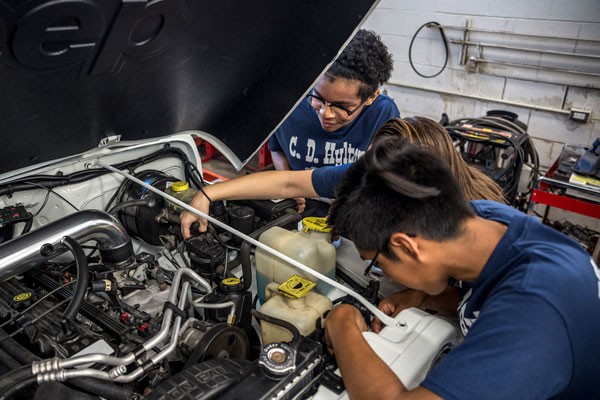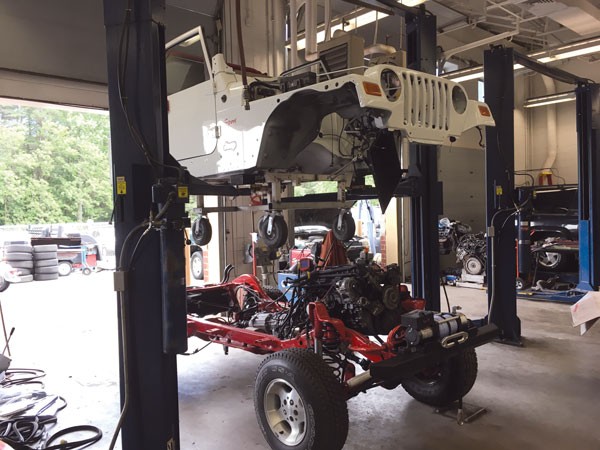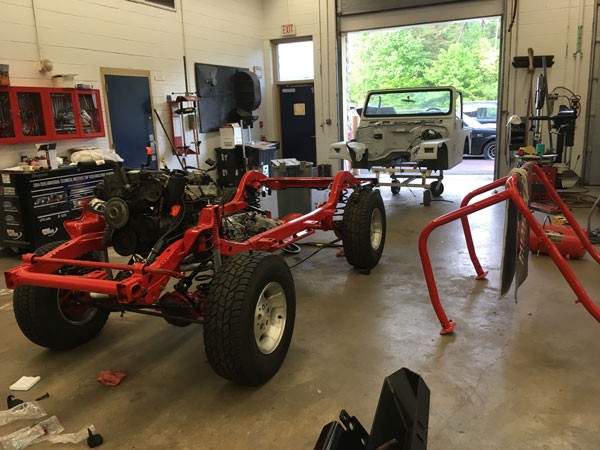Hylton Auto Repair training can indeed pave the way for a fulfilling automotive career by providing comprehensive education and hands-on experience. AUTO-REPAIR-TRAINING.EDU.VN serves as your ultimate resource, equipping you with both the technical skills and business acumen necessary to excel, whether you aspire to be a skilled technician or a successful garage owner. Explore our resources covering ASE certification, crafting a robust business plan, and detailed step-by-step guides to get started today.
1. What is Hylton Auto Repair Training and Why is it Important?
Hylton auto repair training refers to the automotive education programs at C.D. Hylton High School in Woodbridge, Virginia, which provides high-quality hands-on experience. It is crucial as it equips students with industry-relevant skills, preparing them for successful careers in automotive technology and customization. This training not only enhances their technical abilities but also fosters creativity and problem-solving, essential for thriving in the dynamic automotive sector.
Hylton High School’s automotive program demonstrates how educational initiatives can bridge the gap between academic learning and real-world application. By participating in projects like the SEMA High School Vehicle Build Program, students gain invaluable experience in vehicle modification and restoration. The program enhances their skills and also inspires them to pursue careers in the automotive industry. Such programs are vital because they address the growing demand for skilled technicians and innovators in the automotive field.
The importance of such training extends beyond individual skill development. It benefits the entire automotive industry by nurturing a new generation of professionals passionate about innovation and excellence. These well-trained individuals contribute to improved service quality, technological advancements, and overall industry growth. Moreover, the hands-on experience gained through these programs ensures that graduates are job-ready and can immediately contribute to their workplaces.
2. What Career Paths Can Hylton Auto Repair Training Lead To?
Hylton auto repair training can lead to a variety of rewarding career paths in the automotive industry, from entry-level positions to specialized roles. The specific paths include automotive technician, service advisor, customization specialist, and shop owner. Each of these roles requires a unique skill set, but all benefit from a strong foundation in auto repair principles and practices.
-
Automotive Technician: This is one of the most common career paths for graduates of auto repair programs. Automotive technicians diagnose, repair, and maintain vehicles. They work on engines, transmissions, brakes, electrical systems, and more. According to the Bureau of Labor Statistics, the median annual wage for automotive service technicians and mechanics was $46,830 in May 2022. The demand for skilled technicians is expected to remain steady, with about 69,000 openings projected each year over the next decade.
-
Service Advisor: Service advisors act as the liaison between customers and technicians. They listen to customer concerns, diagnose vehicle issues, provide repair estimates, and communicate updates throughout the repair process. This role requires excellent communication and customer service skills, as well as a solid understanding of auto repair procedures.
-
Customization Specialist: With the increasing popularity of vehicle customization, there’s a growing demand for specialists who can modify vehicles to meet individual preferences. Customization specialists may work on cosmetic enhancements, performance upgrades, or specialized modifications for off-road or racing applications.
-
Shop Owner/Manager: With experience and additional business training, graduates of auto repair programs can advance to management positions or even open their own auto repair shops. This path requires a combination of technical expertise, leadership skills, and business acumen. Owners are responsible for overseeing all aspects of the business, from hiring and training staff to managing finances and marketing services.
3. How Does Hylton Auto Repair Training Integrate Hands-On Experience?
Hylton auto repair training effectively integrates hands-on experience through real-world projects, vehicle customization, and restoration activities. This practical approach ensures that students not only learn theoretical concepts but also develop the tangible skills necessary to succeed in the automotive industry. The hands-on component is crucial in transforming classroom knowledge into practical expertise.
Participating in projects, such as the SEMA High School Vehicle Build Program, offers students a comprehensive understanding of the entire vehicle modification process. From initial assessment and planning to final execution and presentation, students are involved in every stage. This hands-on experience allows them to apply their knowledge in a meaningful context, reinforcing their learning and building confidence.
Vehicle customization and restoration are other critical components of Hylton’s hands-on training. Students work on various projects that require them to disassemble, repair, and reassemble vehicles. This process helps them understand the intricacies of automotive systems and develop problem-solving skills. For instance, students at C.D. Hylton High School restored a 2002 Jeep Wrangler TJ Sport, gaining experience in frame-off restoration, cosmetic enhancements, and performance modifications.
Furthermore, the program’s emphasis on documenting the entire build process, as seen in the Bulldog Builds YouTube series, adds another layer of practical experience. Students learn to communicate their work effectively, showcasing their skills and knowledge to a broader audience. This type of documentation is valuable for future career opportunities, as it provides a portfolio of their work.
 Students working on a Jeep during the SEMA High School Vehicle Build Program
Students working on a Jeep during the SEMA High School Vehicle Build Program
4. What are the Key Skills Learned in Hylton Auto Repair Training?
The key skills learned in Hylton auto repair training include diagnostic skills, repair techniques, customization expertise, and project management. These skills are essential for success in various automotive careers and are developed through a combination of classroom instruction and hands-on experience. The training program ensures students are well-prepared for the demands of the automotive industry.
Diagnostic skills are fundamental for identifying and resolving vehicle issues. Students learn how to use diagnostic tools and equipment to accurately assess problems with engines, transmissions, electrical systems, and other components. This involves understanding schematics, interpreting data, and applying logical reasoning to pinpoint the root cause of malfunctions.
Repair techniques cover a broad range of procedures, from basic maintenance to complex repairs. Students gain proficiency in tasks such as replacing brakes, servicing engines, repairing transmissions, and troubleshooting electrical problems. They learn to use hand tools, power tools, and specialized equipment to perform these tasks efficiently and effectively.
Customization expertise is another valuable skill gained through Hylton auto repair training. Students learn how to modify vehicles to meet specific performance or aesthetic goals. This may involve installing lift kits, upgrading engines, customizing interiors, or applying custom paint finishes. The SEMA High School Vehicle Build Program provides an excellent opportunity for students to develop these skills.
Project management skills are developed through involvement in comprehensive build projects. Students learn how to plan, organize, and execute projects from start to finish. This includes setting goals, managing budgets, coordinating tasks, and working collaboratively as a team. These skills are crucial for success in any automotive career, whether working as a technician or managing a repair shop.
5. How Can Hylton Auto Repair Training Help in Starting an Auto Repair Business?
Hylton auto repair training provides a solid foundation for starting an auto repair business by equipping aspiring entrepreneurs with technical skills, project management experience, and industry connections. While the training primarily focuses on technical aspects, the skills and experiences gained are directly transferable to the challenges of running a business. AUTO-REPAIR-TRAINING.EDU.VN can further supplement this foundation with resources on business planning, marketing, and financial management.
The technical skills acquired through Hylton auto repair training are essential for providing high-quality service and building a reputation for excellence. As a business owner, having a deep understanding of auto repair procedures allows you to oversee operations, train staff, and ensure customer satisfaction. This hands-on expertise sets you apart from purely administrative business owners and enhances your credibility with customers.
Project management experience gained through programs like the SEMA High School Vehicle Build Program is also invaluable. Starting and running an auto repair business requires careful planning, organization, and execution. The ability to manage projects efficiently, set realistic goals, and coordinate tasks is crucial for staying on track and meeting deadlines.
Industry connections made through the training program can provide valuable networking opportunities and access to resources. Building relationships with suppliers, vendors, and other professionals in the automotive industry can help you secure favorable deals, access new technologies, and stay informed about industry trends.
6. What Additional Resources Does AUTO-REPAIR-TRAINING.EDU.VN Offer?
AUTO-REPAIR-TRAINING.EDU.VN offers a comprehensive suite of resources to complement Hylton auto repair training, including detailed guides on business planning, marketing strategies, financial management, and legal compliance. These resources are designed to help aspiring entrepreneurs navigate the complexities of starting and running an auto repair business. By combining technical training with business education, individuals can increase their chances of success in the competitive automotive market.
The business planning guides provide step-by-step instructions on creating a solid business plan. This includes conducting market research, defining your target audience, analyzing competitors, and developing a unique value proposition. A well-crafted business plan is essential for securing funding, attracting investors, and guiding your business decisions.
The marketing strategies section offers advice on promoting your auto repair business and attracting customers. This includes developing a marketing plan, creating a website, using social media, and implementing advertising campaigns. Effective marketing is crucial for building brand awareness, generating leads, and increasing sales.
The financial management resources cover topics such as budgeting, accounting, cash flow management, and financial analysis. Understanding financial principles is essential for making informed business decisions and maintaining profitability. These resources provide practical tips and tools for managing your finances effectively.
 Close-up of a student working on an engine
Close-up of a student working on an engine
7. What Are the Steps to Opening an Auto Repair Shop After Training?
Opening an auto repair shop after completing Hylton auto repair training involves several key steps: developing a business plan, securing funding, finding a suitable location, obtaining licenses and permits, purchasing equipment, hiring staff, and marketing your services. Each of these steps requires careful planning and execution to ensure the success of your business. AUTO-REPAIR-TRAINING.EDU.VN provides detailed guides and resources to help you navigate each stage of the process.
-
Develop a Business Plan: A comprehensive business plan is essential for outlining your business goals, strategies, and financial projections. This includes conducting market research, analyzing competitors, defining your target audience, and developing a marketing plan. A well-crafted business plan is crucial for securing funding and guiding your business decisions.
-
Secure Funding: Starting an auto repair shop requires significant capital investment. You may need to secure funding through loans, grants, or investors. Research different funding options and prepare a compelling business proposal to attract potential lenders or investors.
-
Find a Suitable Location: The location of your auto repair shop can significantly impact its success. Choose a location that is easily accessible, has high visibility, and is in an area with a high demand for auto repair services. Consider factors such as zoning regulations, traffic patterns, and the presence of competitors.
-
Obtain Licenses and Permits: Before opening your doors, you must obtain all necessary licenses and permits. This may include a business license, an auto repair license, and environmental permits. Contact your local and state government agencies to determine the specific requirements in your area.
-
Purchase Equipment: Equipping your auto repair shop with the right tools and equipment is essential for providing quality service. This includes diagnostic tools, lifts, compressors, welders, and hand tools. Research different equipment options and choose those that best meet your needs and budget.
-
Hire Staff: Hiring qualified and experienced staff is crucial for delivering excellent service and building a loyal customer base. Look for technicians with relevant certifications and experience, as well as service advisors with strong communication and customer service skills.
-
Market Your Services: Effective marketing is essential for attracting customers and building brand awareness. Develop a marketing plan that includes online and offline strategies, such as creating a website, using social media, advertising in local publications, and participating in community events.
8. What are the Potential Earnings in the Auto Repair Industry?
The potential earnings in the auto repair industry vary widely depending on factors such as position, experience, location, and business ownership. Entry-level technicians may start at lower wages, but experienced technicians and shop owners can earn substantial incomes. The Bureau of Labor Statistics provides detailed data on the median annual wages for various automotive occupations.
According to the Bureau of Labor Statistics, the median annual wage for automotive service technicians and mechanics was $46,830 in May 2022. The lowest 10 percent earned less than $30,790, and the highest 10 percent earned more than $78,270. Earnings can vary significantly based on experience, certifications, and specialization.
Service advisors typically earn a combination of salary and commission, with potential earnings ranging from $40,000 to $70,000 per year. Earnings depend on factors such as sales performance, customer satisfaction, and the size of the dealership or repair shop.
Shop owners have the potential to earn significantly more, but their income is also subject to greater variability. The income of a shop owner depends on factors such as the size of the business, the quality of service, the effectiveness of marketing efforts, and the overall economic climate. Successful shop owners can earn six-figure incomes, but it requires hard work, dedication, and sound business management skills.
9. How Does ASE Certification Enhance Career Prospects?
ASE (Automotive Service Excellence) certification significantly enhances career prospects for auto repair professionals by validating their skills and knowledge. ASE certification is widely recognized and respected in the automotive industry, demonstrating a technician’s competence and commitment to quality. Holding ASE certifications can lead to higher earning potential, increased job opportunities, and greater credibility with customers.
ASE certification is earned by passing rigorous exams that cover various areas of automotive repair, such as engine repair, brakes, electrical systems, and more. Technicians must also have a certain amount of hands-on experience to qualify for certification. Once certified, technicians must recertify every five years to maintain their credentials.
For employers, hiring ASE-certified technicians provides assurance of their skills and knowledge. ASE certification is often a requirement for employment at reputable dealerships and repair shops. Employers may also offer higher wages and benefits to ASE-certified technicians.
For customers, choosing an ASE-certified technician provides peace of mind knowing that their vehicle is being serviced by a qualified professional. ASE certification demonstrates a commitment to quality and professionalism, which can build trust and loyalty with customers.
 Students collaborating on a vehicle project
Students collaborating on a vehicle project
10. What are Common Challenges in the Auto Repair Industry and How to Overcome Them?
Common challenges in the auto repair industry include keeping up with technological advancements, managing costs, attracting and retaining skilled technicians, and maintaining customer satisfaction. Overcoming these challenges requires a combination of continuous learning, efficient management practices, and a strong commitment to customer service. AUTO-REPAIR-TRAINING.EDU.VN offers resources and advice to help you navigate these challenges and build a successful auto repair business.
-
Keeping Up with Technological Advancements: The automotive industry is constantly evolving, with new technologies and systems being introduced regularly. Technicians must stay up-to-date with these advancements to effectively diagnose and repair modern vehicles. This requires continuous learning through training courses, workshops, and industry publications.
-
Managing Costs: Running an auto repair business involves significant costs, including rent, utilities, equipment, and labor. Efficient cost management is essential for maintaining profitability. This includes tracking expenses, negotiating with suppliers, and implementing cost-saving measures.
-
Attracting and Retaining Skilled Technicians: Finding and keeping qualified technicians can be a challenge, especially in competitive markets. Offering competitive wages, benefits, and training opportunities can help attract and retain top talent. Creating a positive work environment and providing opportunities for advancement can also improve employee retention.
-
Maintaining Customer Satisfaction: Customer satisfaction is crucial for building a loyal customer base and generating positive word-of-mouth referrals. This requires providing high-quality service, communicating effectively with customers, and resolving complaints promptly and fairly.
Are you ready to accelerate your career in the automotive industry or launch your own auto repair business? Contact AUTO-REPAIR-TRAINING.EDU.VN today for expert guidance, comprehensive training programs, and invaluable resources. Reach out to us at our U.S. office located at 200 N Michigan Ave, Suite 1500, Chicago, IL 60601, United States, or connect with us via WhatsApp at +1 (641) 206-8880. Visit our website at AUTO-REPAIR-TRAINING.EDU.VN to explore the endless possibilities awaiting you in the world of auto repair.